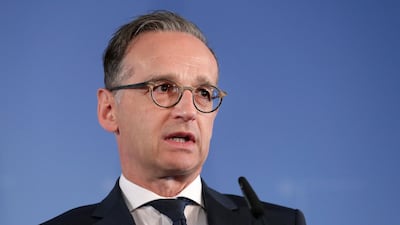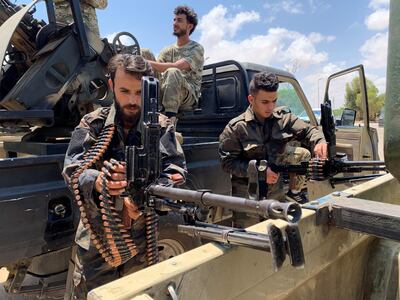Escalating conflict in Libya threatens to do irreparable damage, Germany's foreign minister said.
Heiko Maas, speaking before Wednesday's UN Security Council meeting chaired by Germany, criticised the deteriorating situation in the North African country and urged the international community to act.
"The situation in Libya is not getting better. On the contrary: the escalation of the past weeks and months threatens to tear the country apart for good. Not even a global pandemic has been able to stop this development,” Mr Maas said.
“While the whole world closed its borders, ships, planes and trucks with weapons and mercenaries arrived in Libyan cities. The people in Libya are suffering most of all. The risk of the conflict spreading in the region is also increasing,” he said.
Mr Maas said that six months had passed since the Berlin Conference on Libya.
The summit of world powers in January sought to build on a tentative truce in Libya and find a path to peace after years of instability.
In the months since, violence increased and the principal point of progress, a recommitment to Libya’s long-flouted arms embargo, lay in tatters.
The country was now more awash with arms and foreign fighters than before.
After the intervention in Libya by Turkey, the country’s Government of National Accord (GNA) had ended a year-long offensive on the capital, Tripoli, by Libyan National Army (LNA) commander Field Marshal Khalifa Haftar.
GNA forces – reinforced by thousands of fighters supplied by Turkey and Ankara’s air power – faced down the LNA in the coastal town of Sirte and the resource-rich oil crescent beyond.
Speaking to the UN Security Council, James Cleverly, British Minister of State for the Middle East and North Africa, called for a ceasefire in Libya.
"There is now a window of opportunity to make real progress and change Libya’s troubled trajectory. We welcome the engagement of the parties in the UN-led 5+5 military talks, which we are supporting as co-chairs of the security working group. This is especially important now given the high risk of further escalation around Sirte," he said.
Before Wednesday’s UN meeting, Germany hosted a video call with the UN’s acting envoy to Libya, Stephanie Williams.
In Moscow, Foreign Minister Sergey Lavrov was quoted as saying that Russia and Turkey were working on an immediate ceasefire agreement for the conflict in Libya.
The LNA was ready to sign a ceasefire document, and Mr Lavrov hoped that Turkey would manage to convince the GNA to do the same.
The UN Support Mission in Libya, which Ms Williams heads, on Tuesday said it gave its full support to Libya’s National Oil Corporation (NOC) as it lifts force majeure nationwide.
On Wednesday, NOC lifted the measures on the Es Sider oil terminal, under blockade for six months, paving the way for higher oil exports from the Opec member.


